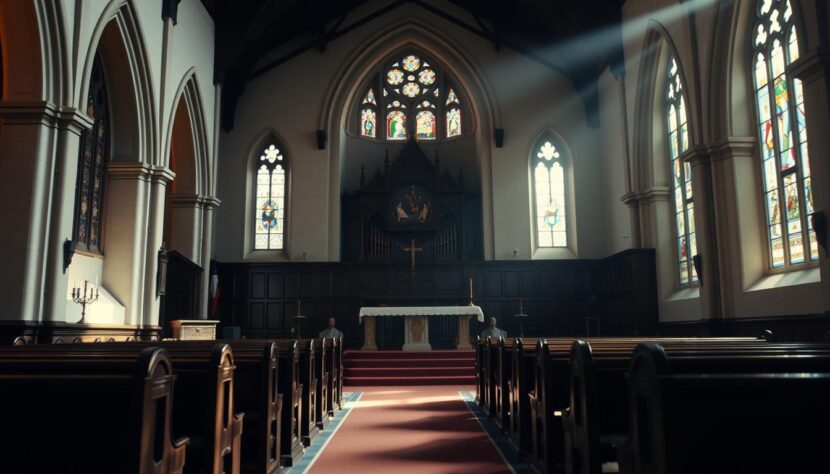The Anglican Church is a lively part of Christianity, filled with deep history and varied traditions. It started in the 1500s with the English Reformation. Today, it’s a big church with over 70 million followers worldwide12.
It stretches across the globe, linking about 1.5 million people in the U.S2.. Anglican traditions mix old Celtic spirituality with medieval church ways3. This article explores Anglican beliefs, practices, and history. It shows how these ideas are still important today.
Key Takeaways
- The Anglican Church emerged during the English Reformation.
- It consists of approximately 70 million members worldwide.
- Anglican traditions blend ancient practices with modern theology.
- Over 1.5 million members are affiliated with the Anglican Communion in the U.S.
- Anglicanism has a rich history spanning nearly 1,700 years.
Introduction to the Anglican Church
The Anglican Church is a big part of Christianity, with about 85 million members worldwide. It is found in over 165 countries45. It started in 1534 when King Henry VIII wanted to break away from the Roman Catholic Church. This move created a unique blend of Catholic and Protestant traditions5.
The Anglican faith looks for a balance between Scripture, tradition, and reason. This balance is known as the via media5.
The Anglican Communion has 39 provinces, each with its own freedom. There is no single leader over all of them4. The Church of England is a key part of this global family, making up about 10% of Anglicans. The 1662 prayer book is still the official guide, but many services now use modern language4.
Anglicans are known for their mission work, especially in areas without churches. This has led to the creation of many dioceses around the world. It shows the church’s dedication to spreading the word and helping communities4.
Most Anglicans, about 80%, live outside the UK. This highlights the church’s global reach and the need for local expressions of faith4.
Historical Roots of Anglicanism
The Anglican Church’s roots are deeply connected to the English Reformation. This movement changed how people practiced and viewed religion in England. It led to the creation of Anglicanism as we know it today.
The English Reformation
The English Reformation was a big change in Christian practices in England. Christianity was present in the British Isles since the 3rd century, showing a long religious history6. By the 4th century, the church was established, with British bishops attending the Council of Arles in 3146.
In 596, St. Augustine came to England to spread Christianity. He converted the King of Kent and many others by 5976. The Synod of Whitby in 664 was another key moment, as the church in Northumbria chose to follow Roman practices6.
King Henry VIII’s desire to annul his marriage to Catherine of Aragon led to a break with Rome in the 1500s7. Archbishop Thomas Cranmer played a big role in this, declaring Henry’s marriage invalid in 1533. He also helped create the Book of Common Prayer, a key text in Anglicanism7.
The English Reformation was more than just a split. It brought deep changes in theology that lasted for centuries.
Key Figures in Anglican History
Many important figures have shaped Anglican history. Thomas Cranmer was key in revising the Book of Common Prayer and setting a Protestant foundation for the church after Henry VIII’s death6. Queen Elizabeth I also played a big role, helping to solidify Anglicanism against Catholic resurgence. The 39 Articles of Religion were formalized during her reign, blending Protestant and Catholic elements7.
Richard Hooker was another important figure, whose writings laid the groundwork for modern Anglican thought. His work showed the complex links between faith, theology, and politics in Anglican history8. These figures highlight how Anglicanism evolved, with governance, community, and belief deeply connected throughout its history.
Anglican Beliefs and Doctrines
Anglicanism is a rich mix of beliefs and doctrines. These are deeply rooted in its history and theology. At the heart are the Thirty-Nine Articles and key texts that guide its worship. The Anglican Church holds Scripture as authoritative, yet stays true to early Church creeds.
Core Tenets of Faith
Anglican doctrines are built on the faith’s core tenets. They believe in Jesus Christ as the Savior, showing unity among Anglicans worldwide. About 78 million Anglicans are part of this global community9.
The Apostles’, Nicene, and Athanasian creeds capture the faith’s essence. They align with Article VIII of the Thirty-Nine Articles, affirming their scriptural basis10. Anglican doctrine finds a balance between Reformed and Catholic traditions. It spans from evangelical to Anglo-Catholic beliefs10.
The Book of Common Prayer
The Book of Common Prayer is central to Anglican worship. It guides practices and shapes community life. This document has evolved since the Reformation, linking modern worship to historical doctrines10.
The liturgical calendar adds a rhythm to worship, reflecting the Church’s heritage9. Anglicanism sees Baptism and the Eucharist as means of grace. These are key to the faith’s practice and community life9.
The Role of Scripture in Anglicanism
Anglicanism deeply values the Holy Scriptures as its core. The Bible is seen as the ultimate guide for beliefs and actions. For centuries, the Anglican tradition has emphasized the Bible’s importance in worship and understanding faith.
The Authority of the Bible
The Anglican Church believes the Bible is the highest authority in faith matters. It has always required a Bible in every church, showing its importance. The 1549 Book of Common Prayer’s preface stresses the need for everyone to have access to the Bible.
Anglicans read from the Bible during services. They hear from the Old Testament, Psalms, Epistles, and Gospels every Sunday11.
Interpretation and Tradition
Anglicanism balances tradition, reason, and Scripture in its interpretation. The church’s history shows that readings address today’s issues while staying true to tradition. For Anglicans, Scripture is more than just words; it sparks a lively theological conversation within the community.
This approach differs from some other religious groups, like nondenominationalism. In Anglicanism, the focus on Christ changes how the Bible is understood, unlike in nondenominational churches12.
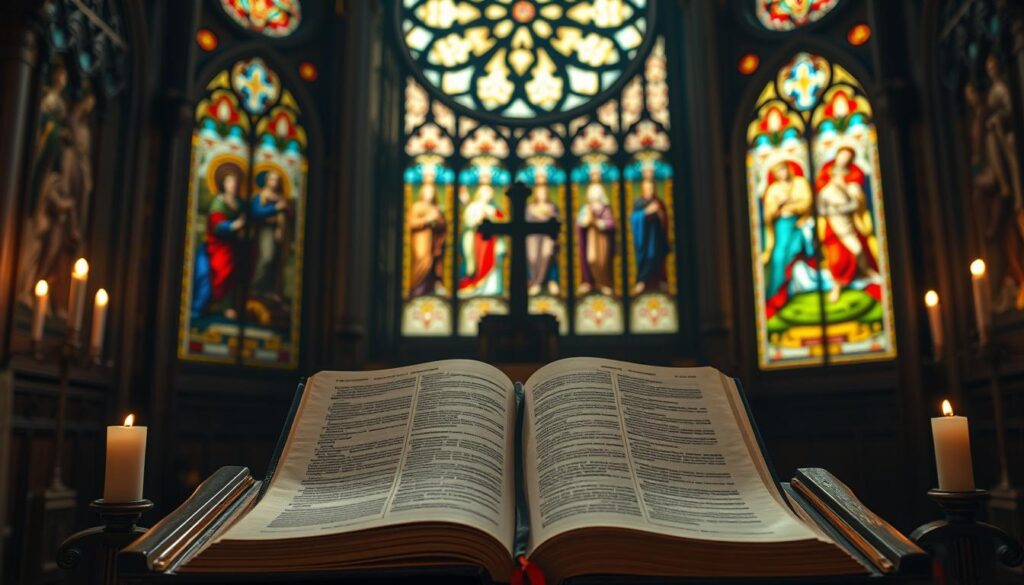
Anglican Worship and Liturgy
Anglican worship is a blend of tradition, scripture, and community. It’s designed to make everyone feel connected and reverent. The Book of Common Prayer guides the liturgy, using a three-year lectionary for scripture readings13. This ensures the congregation hears a variety of biblical passages over time13.
Services are divided into two parts: the Service of the Word and the Service of the Sacrament. The former focuses on scripture readings and sermons, taking up about 33% of the service14.
Structure of Anglican Services
Services are structured to create a shared spiritual experience. They include readings from the Old Testament, Epistles, and Gospels, ensuring a deep engagement with Scripture13. Creeds like the Nicene Creed are recited regularly, strengthening Anglican traditions and the community’s faith14.
Communal prayers, based on biblical teachings, encourage collective supplication, intercession, and thanksgiving14. Practices like the Passing of the Peace highlight the importance of community reconciliation14. Up to 75% of congregations use the Book of Common Prayer in their Sunday services, showing its key role in Anglican worship14.
Liturgical Seasons and Their Significance
Liturgical seasons are crucial in Anglican worship, each with its own themes tied to Jesus Christ’s life. The cycles of Advent, Epiphany, Lent, Easter, Pentecost, and Ordinary guide congregations through spiritual growth and reflection15. Each season introduces unique prayers and themes, deepening the understanding of the Gospel15.
This seasonal observance enriches communal worship, allowing congregants to celebrate their faith and traditions together15.
The Sacraments in Anglican Practice
The sacraments in the Anglican Church are very important. Baptism and confirmation are key. They are seen as special signs of faith, given by Christ. The Thirty-Nine Articles say Baptism and the Eucharist are needed for salvation16.
This shows their role in growing faith in people and the church16.
Understanding Baptism and Confirmation
Baptism is how people start their journey in Christianity. It uses water, in the name of the Father, Son, and Holy Spirit. It means dying to sin and being reborn in righteousness17.
It’s for those who have faith in Jesus. Most baptisms are of infants, so they can grow up in the faith. Confirmation comes after baptism. It’s when the bishop lays hands on you, giving you the Holy Spirit’s strength17.
The Eucharist: Meaning and Importance
The Eucharist is a key part of Anglican worship. It’s seen as a way to grow spiritually and strengthen faith. The bread and wine remind us of Christ’s presence16.
Anglicans have different views on Christ’s presence in the Eucharist. This leads to interesting discussions. Communion is more than a ritual. It’s a way to remember Christ’s sacrifice and bond with each other16.
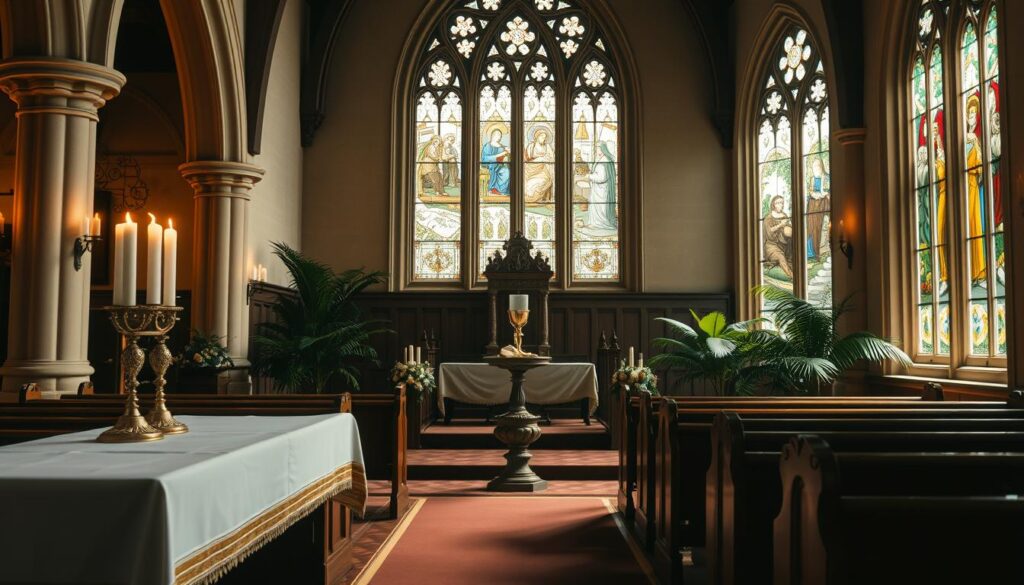
Variations Within Anglicanism
The Anglican Communion is known for its wide range of traditions and expressions. It has about 110 million followers, making it the third-largest Christian group worldwide18. This diversity adds richness to Anglican traditions, blending different cultures into its worship.
The Anglican Communion and Global Diversity
The Anglican Communion is the largest Protestant group globally. It has grown from a British faith to a worldwide movement19. It spread mainly through British imperialism and missionary work during the British Empire’s expansion19.
The term “Anglicanism” was introduced in the 19th century. It shows the mix of different theological views. After the American Revolution, Anglican churches outside England gained independence19.
Traditions of Churchmanship
Anglican churchmanship spans from high church to low church traditions. The Book of Common Prayer, first published in 1549, has been key in shaping worship20. It brought scripture and liturgy together. Recent events, like the Global Anglican Future Conference (GAFCON) in 2023, show different views on scripture20.
| Churchmanship Type | Characteristics | Examples |
|---|---|---|
| High Church | Emphasizes liturgical tradition, ritual, and the sacraments. | Anglo-Catholic Churches |
| Low Church | Focuses on scripture, preaching, and personal faith. | Evangelical Anglican Churches |
| Meditative Traditions | Utilizes contemplative practices and the Daily Office. | Monastic Communities like the Melanesian Brotherhood |
Women in the Anglican Church
Women in the Anglican Church have made big contributions over time. They’ve shaped theology, mission work, and community service. Their roles have changed as society’s views on gender equality and leadership have evolved.
Historical Context and Contributions
The debate on women’s ordination in the Anglican Church has lasted nearly 50 years. Different provinces have taken different stands21. In Australia, women became deacons in 1985 and priests in 1992. Female bishops were allowed from 200722.
Canada welcomed its first female priest in 197622. England followed in 1992. A 2016 report showed 56% of Anglican Communion provinces allow women’s ordination21. This shows the ongoing conversation about women’s roles and church changes.
Recent Developments in Leadership
Recently, more women have become Anglican women leaders, including priests and bishops. In the Episcopal Church of the U.S., about 36% of new priests were women in 201921. The global Anglican Church has around 85 million members, with many supporting women’s ordination. Yet, some oppose it based on scripture21.
In the Anglican Church in North America, women won’t be bishops. This shows the differences in leadership developments across regions23.
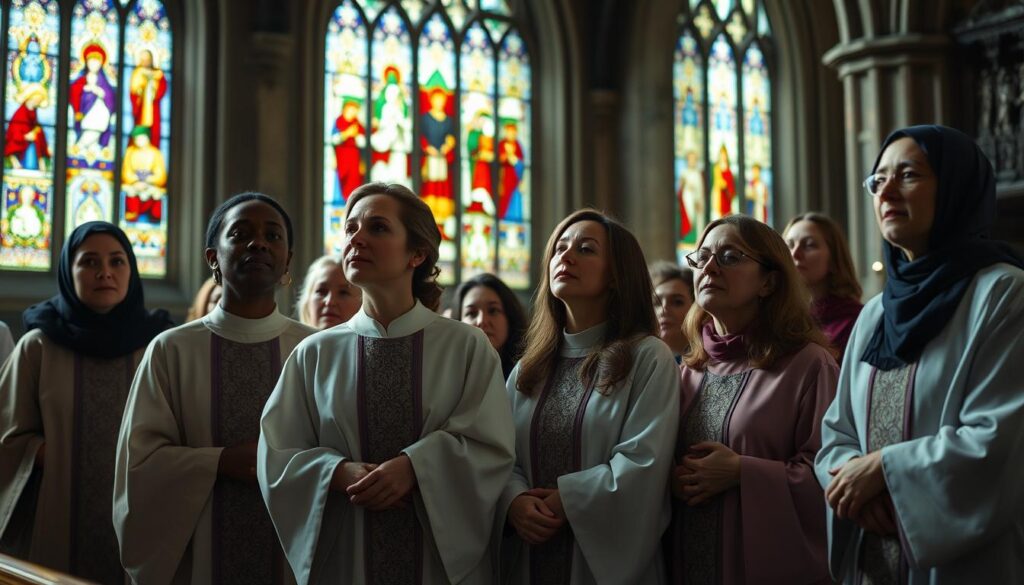
| Country | First Female Ordination | Year | Latest Developments |
|---|---|---|---|
| Australia | Deacon | 1985 | Priests in 1992, Bishops in 2007 |
| Canada | Priest | 1976 | Ongoing support for ordination |
| England | Deacon | 1985 | Priests in 1992, Bishop in 2014 |
| U.S. | Priest (Philadelphia Eleven) | 1974 | Regularized in 1976 |
| New Zealand | Priest | 1977 | Continued focus on women in ministry |
As the Anglican Church works on gender equality, women’s contributions will keep shaping its future22.
Anglican Social Justice Initiatives
The Anglican Church is deeply involved in social justice through community outreach. It tackles issues like poverty, homelessness, and human trafficking. The church’s advocacy shows its dedication to helping those in need and fighting for equality.
Recent data shows that about 33 million people in the U.S. struggle with food insecurity, including 5 million children24. These numbers highlight the urgent need for outreach efforts.
Community Engagement and Outreach
The church encourages its members to tackle local and global problems. Around 100 Anglicans attended the Outreach and Advocacy Conference25. They discussed pressing issues like housing, food insecurity, and access to clean water.
In Canada, some Indigenous communities have waited up to 80 years for clean drinking water25. This shows the importance of addressing these issues quickly.
The Role of the Church in Social Issues
The Anglican Church plays a significant role in social activism. It fights against human trafficking, a major global issue24. In the U.S., 564,708 people were homeless on a single night, highlighting the need for affordable housing24.
The church aims to create a culture of compassion and care. It advocates for marginalized communities, showing its commitment to social justice.
Anglican Identity in Modern America
The Anglican Church in America faces both challenges and opportunities. Membership trends show a complex picture for the Episcopal Church, the American branch of the Anglican Communion. Globally, the Anglican Communion has about 85 million members. In the U.S., there were around 1.7 million members in 202226.
While some churches are losing members, others attract low-church evangelicals. They seek a global Church connection. Ministries are working to engage younger people, helping to revitalize Anglican youth involvement.
Membership Trends and Demographics
The Episcopal Church’s demographics are changing, making it hard to keep a unified anglican identity. About 40% of parishes are Evangelical (Reasserters), showing a big theological change26. Fewer than 20% of Anglicans can list the Thirty-Nine Articles without help, showing a shift in beliefs26.
The Anglican Church has seen more sects and groups split off. This makes it harder to define Anglicanism in America27.
Youth Involvement and Future Directions
Getting young people involved in Anglicanism is key for its future. Programs like intergenerational worship and community service help. They let young people explore their faith, even with challenges like recognizing holy orders27.
Younger generations are vital for Anglicanism’s future. They can help shape their faith community through active participation.
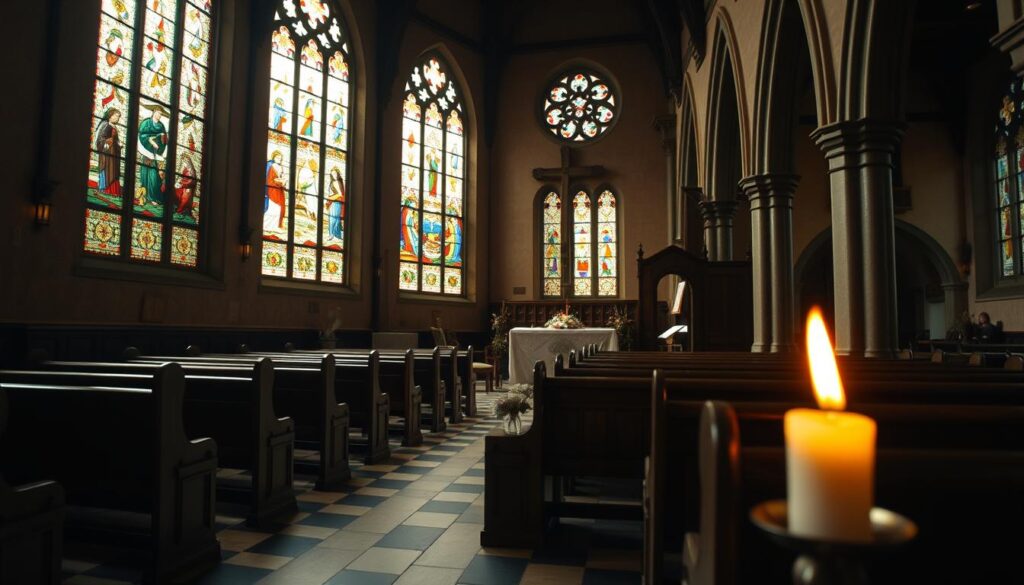
Ecumenical Relations and Dialogues
The Anglican Church has a long history of anglican ecumenism. It aims to strengthen relationships with other denominations for unity in the Christian world. This journey began in the sixteenth century, a time of big changes during the Reformation28.
This effort is seen in many dialogues and agreements. They aim to bridge historical gaps and work together across different faiths.
Anglicanism and Other Christian Denominations
For over 60 years, Anglicans and Catholics have been in dialogue29. The Chicago-Lambeth Quadrilateral, set in 1888, lays out key principles for unity28. In 2001, the Anglican Church of Canada and the Evangelical Lutheran Church in Canada became fully united, showing real progress in global ecumenism28.
These agreements come after deep talks among theologians and leaders. They focus on learning from each other and understanding as key parts of the process29.
Participating in Global Ecumenism
The Anglican Communion plays a big role in global ecumenical efforts. It joins in international dialogues and works on projects like fighting poverty and protecting the environment29. The creation of groups like the Anglican-Lutheran International Commission shows its dedication to building stronger ties with other churches30.
These dialogues show the Anglican Communion’s commitment to working together. They involve many different groups, showing a wide range of efforts towards unity.
Theological Education and Seminaries
Theological education is key for Anglican Church leaders. It prepares them through ministry training that mixes learning and doing. Anglican seminaries teach scriptural studies, pastoral care, and liturgical practices. These are vital for ministry in today’s world.
Training and Formation for Ministry
In Anglican Studies, students learn through the Master of Divinity program. They study Bible, history, theology, practical theology, and Field Education31. Field Education in the second year gives them real experience in Episcopal churches in New York City31.
They work with places like Union Theological Seminary and churches like St. Luke in the Fields Church31. They also join Peer Groups for spiritual growth and support.
Key Seminaries in the United States
The U.S. has top Anglican seminaries for theological education. There are five approved seminaries for training in the Anglican Church in North America32. Nashotah House and Trinity School for Ministry are among them.
Reformed Episcopal Seminary focuses on the inerrancy of God’s Word, with 20% of its curriculum on this32. Asbury Seminary has specializations like Anglican Studies in their Master of Divinity or Master of Arts in Theological Studies32. Each seminary prepares clergy for today’s challenges.
The Role of Music in Anglican Worship
Music is key in Anglican worship, making the liturgy richer. Hymns and choral traditions help people express their faith. They connect deeply with the worship atmosphere.
Hymns and Choral Traditions
Anglican communion services often have two hymns: one at the start and one at the end33. Hymns are not just for these times; they’re used throughout the service. This makes the worship experience more vibrant33.
Traditional choral performances let the community’s voice be heard. They show the heart of Anglican music, making worship more meaningful.
The Influence of Music on Spiritual Life
Music’s role in Anglican spirituality is huge. It makes worship more engaging, helping people connect with God34. A beautiful melody can carry just as much truth as the lyrics, showing music’s emotional power34.
The tradition of singing the whole liturgy shows music’s importance in worship34. Music also helps people, especially older adults and kids, feel part of the church community34.
Navigating Controversies within Anglicanism
The Anglican Church is at a crossroads, facing big anglican controversies that shape its identity. At the heart of these debates is LGBTQ+ inclusion. This topic has sparked strong feelings across different groups. As society changes, so do the views within the Anglican Communion, sometimes leading to disagreements with old beliefs.
The Impact of LGBTQ+ Issues
The topic of LGBTQ+ inclusion deeply affects the Anglican community. Many churches want to be more welcoming, reflecting the changing world. This has led to different opinions, with some focusing on love and acceptance, while others stick to traditional views on marriage and gender.
Anglicanism is slowly changing, with deeper conversations about these issues. This has made the church more divided, raising big questions about unity and its mission.
Debates on Biblical Authority
Along with LGBTQ+ inclusion, the role of biblical authority is key in Anglican debates. Different groups see scripture in different ways, shaping the church’s stance on many issues. Those who hold traditional views believe it’s important to stick to established interpretations to keep the faith true.
On the other hand, some argue for more flexible readings of the Bible, saying understanding changes over time. These disagreements make it hard for the Anglican Church to move forward, especially with the world changing fast.
| Controversial Issues | Traditional View | Progressive View |
|---|---|---|
| LGBTQ+ Inclusion | Marriage as a union between a man and a woman | Full inclusion and recognition of same-sex marriages |
| Biblical Authority | Scripture as the inerrant word of God | Contextual interpretation of scripture in light of modern society |
| Church Governance | Hierarchical structure with bishops | More decentralized, congregational models |
The debates on LGBTQ+ inclusion and biblical authority show the challenges Anglicanism faces. As divisions grow, it makes us think about the church’s future and unity. It reminds us of the need for dialogue and understanding in our diverse world3536.
Conclusion: The Future of the Anglican Church
The Anglican Church is at a crossroads. It must hold onto its rich history while staying relevant today. With most Anglicans in the Global South, the church’s identity is changing37. Nigeria, for example, has over 17 million Anglicans, showing Anglicanism’s growing presence worldwide37.
This shift brings new voices and ideas. The church needs to adapt to local needs while keeping its core values.
The Church of England is debating inclusivity, like blessing same-sex relationships37. This could change how people feel about attending church. The Episcopal Church has seen a big drop in attendance since the pandemic37.
Young people are playing a big role in the Anglican Church, as seen at GAFCON37. New groups like the Global South Fellowship of Anglicans (GSFA) are forming38. They focus on working together and taking action in their communities38.
The church also needs to improve its understanding of the Bible39. Many people struggle to understand their faith deeply39. The upcoming General Synod in Canada could be very divisive39.
In short, the Anglican Church’s future depends on balancing tradition and modern needs. It must tackle today’s issues and deepen its biblical knowledge to stay relevant.
Resources for Further Exploration
For those eager to learn more about Anglicanism, there are many resources available. These resources are for both personal and group learning. The upcoming resources on Anglicanism will have six units, each covering six hours of learning. This allows participants to learn at their own pace with open access materials40.
The Church of England wants to help communities learn together. It encourages local parishes to use these materials for group sessions. These sessions are tailored to fit each community’s needs40.
The Church also offers a lot of Anglican church materials. These materials focus on the teachings of the four Gospels. They highlight the messages of salvation and the English Reformation’s history40.
Resources for group leaders are also available. They help ensure effective communication in church communities. This makes the learning experience better for everyone40.
The church also supports the Resilience course. Over 140 participants from 42 countries have joined Bible-focused sessions. This shows Anglicanism’s global reach41.
These initiatives, along with pastoral care training, enrich spiritual journeys. They also address today’s social issues4042.
FAQ
What are the core beliefs of the Anglican Church?
How did the Anglican Church originate?
What role does the Book of Common Prayer play in Anglican worship?
What sacraments are recognized in the Anglican Church?
How does the Anglican Church approach social justice?
What is the significance of music in Anglican worship?
What are the variations within the Anglican denomination?
How does Anglicanism support theological education?
What challenges does the Anglican Church face today?
How can someone learn more about the Anglican Church?
Source Links
- The Anglican Church: History, Traditions & Beliefs of Anglicanism
- Explaining Anglicans: A Guidebook for Exploring a Tradition-rich, Christ-centered, Spirit-filled, Balanced Faith.
- Exploring the Anglican Tradition in Small Groups Exploring the Anglican Tradition in Small Groups – The Unlikely Priest
- A brief introduction to Anglicanism – St. Andrew’s Anglican Church, Moscow
- Explore the History and Beliefs of the Anglican Denomination
- Anglicanism | History, Beliefs & Practices | Britannica
- History of the Anglican Church
- Anglican Communion | History, Beliefs & Structure | Britannica
- What Do Anglicans Believe? An Overview of Anglican Beliefs
- Anglican doctrine
- Scripture in the Anglican Tradition
- The Place of Scripture in the ACNA | The North American Anglican
- Is Liturgy Important?
- A Rookie Anglican Guide to an Anglican Worship Service
- Why Do Anglicans Have a Liturgy?
- Anglican sacraments
- What Do Anglicans Believe about the Sacraments? (Baptism, Holy Communion, Confirmation, Ordination, Marriage, Absolution, Anointing of the Sick)
- Anglicanism
- The Anglican Way: The Organic Episcopate
- New to Anglicanism?
- Why Women’s Ordination Cannot be Tolerated | The North American Anglican
- Ordination of women in the Anglican Communion
- College of Bishops Statement on the Ordination of Women – The Anglican Church in North America
- Social Justice | Anglicans For Life
- Anglicans explore social justice issues – The Toronto Anglican
- Anglican Identity | The North American Anglican
- Anglican Identity in Unity? Challenges and Opportunities | The North American Anglican
- Anglican Communion and ecumenism
- Ecumenical dialogue – whatever is the rhyme or reason?
- International Anglican Dialogues on Unity
- Episcopal and Anglican Studies
- Approved Seminaries – Next Generation Leadership Initiative
- Music in Worship
- The Role of Music in Liturgical Worship: An Interview with Ryan Flanigan – Three-Stream Living
- A New Generation of Anglicans
- Discerning Friends from Enemies: Critical Race Theory, Anglicans in North America, and the Real Crisis
- A New and Hopeful Future: Anglicans and the Kigali Statement [Fireband Big Read] — Firebrand Magazine
- GSFA, ACNA, and the Future of Conservative Anglicanism – The Living Church
- Does the Anglican Church have a Future? – John Bowen
- OCL: Learning Resources for Growth | OCL
- The Resilience Course – Anglican Alliance
- Exploration and Discernment – Diocese of Winchester

